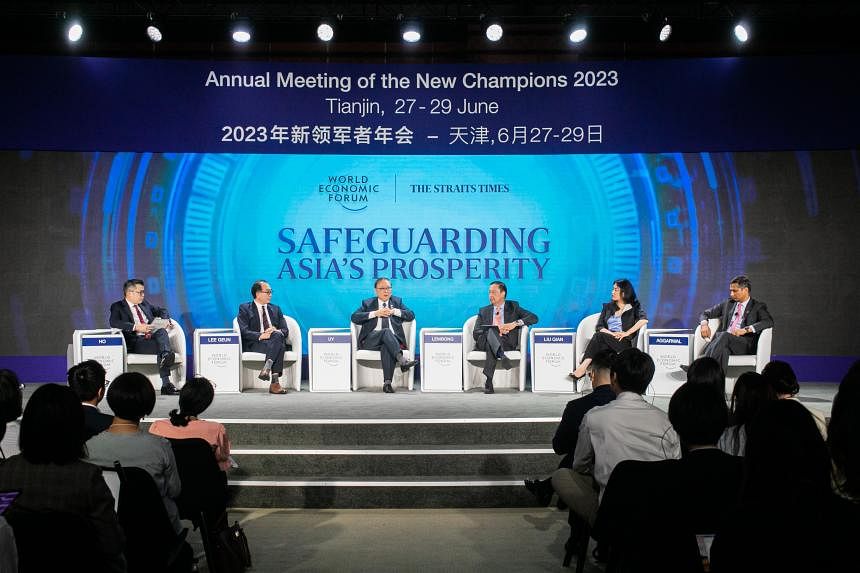TIANJIN - Chinese Premier Li Qiang’s spirited 30-minute morning address on Tuesday giving assurance of higher growth rates, commitment to the market economy and free trade, and building a world “beneficial to all” caught the attention of many at this year’s Summer Davos in Tianjin.
But the second-most attended session on the opening day of the World Economic Forum’s Annual Meeting of New Champions turned out to be an evening session, Safeguarding Asia’s Prosperity.
Close to 300 delegates and participants turned up to better understand the future trajectory of Asia’s outlook.
Despite the promising signs of Asia’s economy lifting global growth, the region finds itself caught amid intense geopolitical tensions between the United States and China.
Other challenges loom, noted panellists at the session, which was developed in collaboration with The Straits Times, and was moderated by ST editor Jaime Ho.
The risk of a miscalculation over Taiwan remains a top concern, but Asia is also still grappling with the consequences of the Ukraine-Russia war, the threat of economic policy weaponisation, cyber security risks, climate change, and potential regime changes around the region, among other things.
Given the difficulty of delinking the region’s economic prospects from politics and other issues, the goal of cooperation – especially with technology opening the doors to significant productivity gains – may be difficult to realise, panellists said.
In an op-ed released before the beginning of the three-day meeting, WEF managing director Mirek Dusek noted that Asia looks set to resume its role as the world’s growth engine.
“In comparison with other regions, Asia-Pacific is by far the brightest spot for economic growth at present, with the International Monetary Fund’s latest estimates projecting the region to contribute 67.4 per cent of all global growth in 2023, and with China alone contributing 34.9 per cent of that total,” he remarked.
“The annual growth rate for the region is projected at 4.6 per cent for 2023, representing a significant increase from the 3.8 per cent growth posted last year and especially strong when considering that global growth projections overall are stagnant.”
Panellist Liu Qian, the Economist Group’s managing director for Greater China, concurred that Asia remains one of the bright spots but drew attention to the risks to growth as well.
Taking up China’s growth rate projections for the year, she said consumer confidence remained low as average income growth has fallen, the likelihood of unemployment is on the rise, and property gains are no longer the same as before.
Also, it should not be forgotten that 26 per cent of the region’s gross domestic product remains susceptible to climate change, said panellist Neeraj Aggarwal, Asia-Pacific chairman of the Boston Consulting Group.
The reality is that 50 per cent of greenhouse gas emissions is produced in Asia and 149 of the world’s 150 most polluted cities are in this region, he said. He added that the region could well contribute 40 per cent to the US$10 trillion (S$13.5 trillion) industry to be shaped by climate change.
Asked to comment on Asean’s potential to bring the US and China closer, the Philippine Secretary of the Department of Information and Communications Technology, Mr Ivan John E. Uy, acknowledged it has been a tightrope for the region.
He added that the upcoming US Chips Act and protectionist measures by China could be developments to watch for the region.
“So far Asean has done well in navigating rough waters”, but it will need to watch out for further disruptions, he said.
The WEF Summer Davos, themed Entrepreneurship: The Driving Force Of The Global Economy, ends on Thursday.
This article has been edited for clarity.


